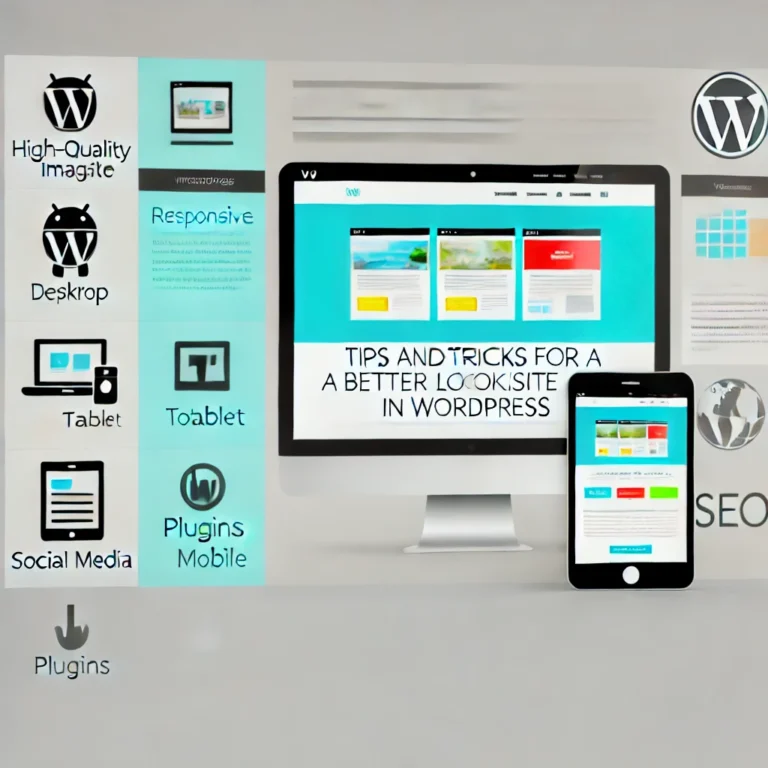What are The Best Blog Post Lengths

Is the Length of your Blog Posts Important?
Not to deliberately confuse you, but the answer to this question is both yes and no! Sorry!
Although offering great content is important, often it depends on what kind of keyword you are regretting and the intent, this is what should dictate the length of the post.
For example, a post about dog training would require far more words (as this would be an informational keyword) whereas a post or page about an individual product would be regarded as transactional) would require far less content.
So, the quick answer is written for the keyword and provides informative, helpful info.
However, there are sweet spots you can consider when creating your content, as follows;
The length of a blog post can dramatically influence its performance. By analyzing data, we can identify the sweet spot for SEO rankings, engagement, and conversion rates. Let’s explore these factors in detail.
SEO Performance
When it comes to SEO, obviously don’t skimp on your content, but don’t write for the sake of it either and definitely don’t write for the algorithm, only write for humans!
The sweet spot we have found over the years ends to be around 1,500 to 2,500 words, provide more opportunities for keywords, allowing them to rank higher on Google, there are exceptions to this rule, but generally thats how I tend to go about content.
Key Findings:
- Posts over 1,500 words tend to have better rankings.
- Longer posts are more likely to attract backlinks and organic traffic.
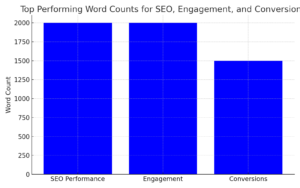
Engagement Metrics
Engagement is typically measured by the time spent on a page, social media shares, and the number of comments.
While longer posts tend to generate more engagement, Although length can give you engagement, it’s vital you balance this out by balancing length with content quality, so many would say this is a far more important factor than length.
Tips:
To help with engagement layout of your content is also important. Dont display large chunks fo text, it puts users off reading it.
Key Findings:
- Posts around 2,000 words see higher engagement in the form of shares and comments.
- Posts longer than 3,000 words may suffer from user fatigue.
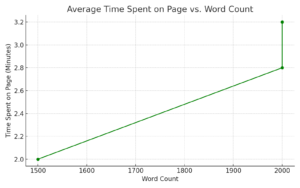
Conversion Rates
So you’ve got the eyeballs on your page/post; they are interested and like what they see!!
Now what?
You want to convert that traffic to whatever action you have for them.
Tip:
The ideal blog length for conversions is often shorter, with posts between 1,000 to 1,500 words performing best for converting readers into leads or customers.
Why? Becuase users ae less distrtacted and will sooner focus on your Call to Action.
Key Findings:
- Posts between 1,000 to 1,500 words lead to the highest conversion rates.
- Shorter posts keep readers focused on call-to-action points, improving overall conversions.
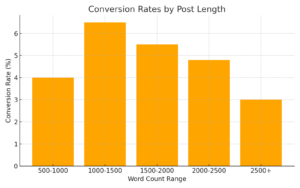
Length Variations by Industry
One thing often overlooked is that different industries react differently to varied blog lengths.
Different industries often perform best with different blog lengths.
For example, technical industries may benefit from more in-depth content, while lifestyle and retail industries see more engagement with shorter, punchier posts, and an Eccommerce environment has very short content, often due to its transactional nature..
Key Findings:
- Tech industries tend to perform best with posts over 2,500 words.
- Retail and lifestyle industries perform better with 1,000 to 1,500-word posts.
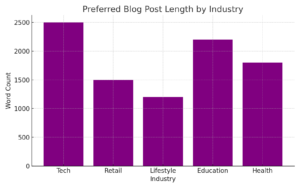
What we Found
Yes, a good amount of high-quality content is good for your website and its SEO and Engagement.
But it’s by no means the beg all and end all!!
Focus mainly on quality, write for the person, not the bot, and factor in the type of keyword you are writing for, It is called the intent.
Tip:
A simply yet obvious bit of advise, if in doubt, put you keyword in google and see whats its ranking for, then take inspiration from it.






